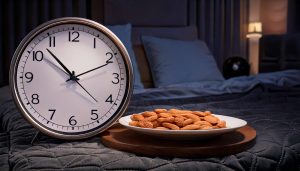PAGE CONTENT:
5 Things to Avoid for Better Sleep
Getting a good night’s sleep is essential for overall health and well-being. Quality sleep helps the body repair itself, boosts the immune system, and enhances cognitive functions such as memory and concentration. However, many people struggle with sleep issues and often unknowingly engage in habits that can disrupt their sleep. Understanding what to avoid before bedtime can significantly improve your sleep quality. This article will explore five key things you should not do to ensure a restful and rejuvenating night’s sleep. By making a few simple adjustments to your evening routine, you can enhance your sleep patterns and wake up feeling refreshed and energized.
Why Should You Avoid Using Electronic Devices Before Bed?
Using electronic devices such as smartphones, tablets, and laptops before bed can severely impact your sleep quality. The blue light emitted by these screens interferes with the production of melatonin, the hormone responsible for regulating sleep. This can make it harder to fall asleep and reduce the overall quality of your sleep. Additionally, engaging with stimulating content, such as social media, emails, or video games, can keep your mind active and make it difficult to unwind. To promote better sleep, try to limit your screen time at least one hour before bed. Instead, consider reading a book, practicing relaxation techniques, or listening to soothing music to help you wind down.
How Does Consuming Caffeine Late in the Day Affect Sleep?
Caffeine is a stimulant that can stay in your system for several hours, making it one of the biggest culprits of disrupted sleep. Consuming caffeine in the afternoon or evening can interfere with your ability to fall asleep and stay asleep. Common sources of caffeine include coffee, tea, soda, and chocolate. To improve your sleep quality, it is best to avoid these caffeinated products at least six hours before bedtime. If you need a beverage in the evening, opt for herbal teas such as chamomile or peppermint, which can help promote relaxation and better sleep.
Why Is Eating Heavy Meals Before Bed Detrimental to Sleep?
Eating large or heavy meals close to bedtime can negatively impact your sleep. When you consume a big meal, your body has to work hard to digest the food, which can keep you awake and cause discomfort. Spicy and fatty foods, in particular, can lead to indigestion and heartburn, making it difficult to fall asleep. To enhance your sleep quality, try to have your last meal at least two to three hours before going to bed. If you feel hungry closer to bedtime, opt for a light snack that is easy to digest, such as a banana or a small bowl of yogurt.
How Can Alcohol Consumption Affect Sleep Quality?
While alcohol may initially make you feel drowsy, it can actually disrupt your sleep cycle. Alcohol can interfere with the restorative stages of sleep, leading to a less restful night. It can also increase the likelihood of waking up during the night and exacerbate sleep disorders such as sleep apnea. To ensure better sleep, it is best to avoid consuming alcohol, especially in the hours leading up to bedtime. If you do choose to drink, try to limit your intake and allow your body enough time to metabolize the alcohol before going to sleep.
Why Is Maintaining a Consistent Sleep Schedule Important?
Irregular sleep patterns can disrupt your body’s internal clock, known as the circadian rhythm, making it harder to fall asleep and wake up at the desired times. Going to bed and waking up at different times each day can confuse your body and lead to poor sleep quality. To promote better sleep, try to establish a consistent sleep schedule by going to bed and waking up at the same time every day, even on weekends. This helps regulate your internal clock and can improve the overall quality of your sleep. Consistency is key to developing healthy sleep habits and ensuring you get the restorative sleep you need.
SUMMARY
For better sleep, avoid using electronic devices before bed, consuming caffeine late in the day, eating heavy meals before bedtime, drinking alcohol in the evening, and maintaining an irregular sleep schedule. Making these changes can significantly improve your sleep quality, ensuring you wake up feeling refreshed and energized.















110 Responses
продажа аккаунтов https://birzha-akkauntov-online.ru
магазин аккаунтов социальных сетей https://marketplace-akkauntov-top.ru
купить аккаунт заработок на аккаунтах
профиль с подписчиками маркетплейс аккаунтов
гарантия при продаже аккаунтов аккаунт для рекламы
аккаунт для рекламы https://kupit-akkaunt-top.ru/
продажа аккаунтов соцсетей https://pokupka-akkauntov-online.ru/
Account Trading https://buyverifiedaccounts001.com/
Sell Account Secure Account Sales
Account Selling Platform Buy Pre-made Account
Account marketplace Sell Pre-made Account
Account Catalog Guaranteed Accounts
Account Catalog Account Market
Accounts marketplace https://buyagedaccounts001.com
Secure Account Purchasing Platform Buy Account
Account trading platform Website for Buying Accounts
Account Trading Sell accounts
Buy accounts Marketplace for Ready-Made Accounts
account acquisition account sale
sell accounts website for buying accounts
account marketplace ready-made accounts for sale
account exchange service website for selling accounts
social media account marketplace secure account purchasing platform
purchase ready-made accounts https://buycheapaccounts.com
online account store verified accounts for sale
account buying platform accounts for sale
gaming account marketplace account selling platform
secure account sales sell pre-made account
gaming account marketplace guaranteed accounts
secure account sales account market
database of accounts for sale website for buying accounts
guaranteed accounts account sale
guaranteed accounts sell pre-made account
account market ready-made accounts for sale
account trading account market
account buying platform account acquisition
account exchange marketplace for ready-made accounts
account market accounts marketplace
secure account sales account exchange
database of accounts for sale guaranteed accounts
buy account buy and sell accounts
account selling service secure account purchasing platform
sell accounts account trading platform
sell pre-made account find accounts for sale
buy and sell accounts account marketplace
buy and sell accounts https://top-social-accounts.org
secure account purchasing platform https://accounts-offer.org
accounts marketplace https://accounts-marketplace.xyz
accounts for sale https://buy-best-accounts.org
database of accounts for sale accounts market
secure account sales https://accounts-marketplace.live
account acquisition https://social-accounts-marketplace.xyz/
account trading https://buy-accounts.space/
secure account purchasing platform accounts marketplace
sell pre-made account https://social-accounts-marketplace.live/
buy account https://buy-accounts.live/
buy account https://accounts-marketplace.online/
guaranteed accounts accounts market
продать аккаунт https://akkaunty-na-prodazhu.pro
продать аккаунт https://rynok-akkauntov.top/
магазин аккаунтов https://kupit-akkaunt.xyz/
купить аккаунт akkaunt-magazin.online
маркетплейс аккаунтов https://akkaunty-market.live/
продать аккаунт kupit-akkaunty-market.xyz
площадка для продажи аккаунтов https://akkaunty-optom.live/
купить аккаунт https://online-akkaunty-magazin.xyz
продать аккаунт https://akkaunty-dlya-prodazhi.pro
продажа аккаунтов https://kupit-akkaunt.online
facebook ad account buy https://buy-adsaccounts.work
cheap facebook account https://buy-ad-accounts.click
buy facebook ads manager https://buy-ad-account.top/
facebook ad account buy https://buy-ads-account.click
buy facebook profile https://ad-account-buy.top
buy facebook advertising accounts https://buy-ads-account.work/
fb account for sale buy aged facebook ads account
buy facebook ad account buy-ad-account.click
facebook ads account for sale buy old facebook account for ads
google ads reseller https://buy-ads-account.top/
buy google ads invoice account https://buy-ads-accounts.click
buy accounts facebook https://buy-accounts.click/
google ads agency accounts https://ads-account-for-sale.top
buy google ads threshold accounts https://ads-account-buy.work
google ads account buy https://buy-ads-invoice-account.top
buy google agency account https://buy-account-ads.work
buy google adwords account https://buy-ads-agency-account.top
old google ads account for sale buy google adwords accounts
google ads accounts for sale https://ads-agency-account-buy.click
buy verified facebook business manager account buy-business-manager.org
buy google ad threshold account https://buy-verified-ads-account.work
facebook bm account https://buy-bm-account.org/
buy facebook ads accounts and business managers buy business manager account
buy facebook business manager accounts buy-verified-business-manager-account.org
buy facebook bm https://buy-verified-business-manager.org/
buy facebook business manager verified https://business-manager-for-sale.org
buy facebook business manager verified https://buy-business-manager-verified.org
facebook bm buy buy bm facebook
buy fb business manager https://verified-business-manager-for-sale.org/
facebook bm account https://buy-business-manager-accounts.org
buy tiktok ads account buy tiktok ads
tiktok ads account buy https://tiktok-ads-account-buy.org
tiktok agency account for sale buy tiktok business account
tiktok agency account for sale https://tiktok-agency-account-for-sale.org
buy tiktok ads accounts https://buy-tiktok-ad-account.org
buy tiktok ads https://buy-tiktok-ads-accounts.org
tiktok ad accounts https://buy-tiktok-business-account.org
buy tiktok ad account https://buy-tiktok-ads.org
buy tiktok ad account https://tiktok-ads-agency-account.org
buy fb ads account profitable account sales account purchase
buy account facebook ads gaming account marketplace account catalog
Terrific work! This is the type of information that should be shared around the internet. Shame on the search engines for not positioning this post higher! Come on over and visit my site . Thanks =)